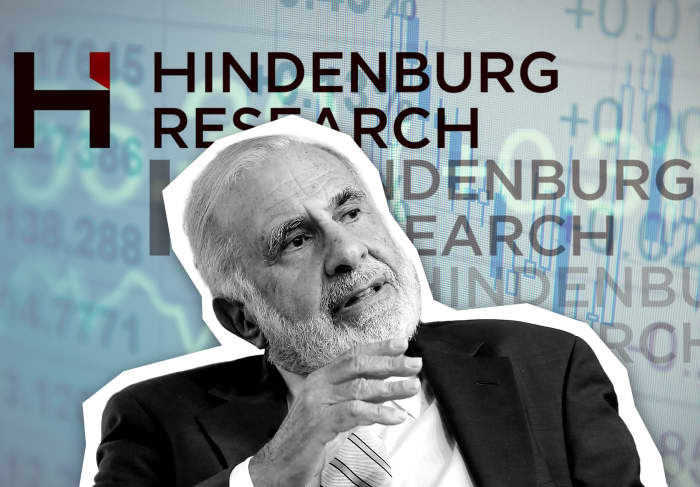Nate Anderson: The King Of Short Selling Who Rose To Fame Even After Getting Some Gains!
Anderson has received an unprecedented amount of attention this year. In January, he shook worldwide markets by coming after the Adani Group — ten publicly listed firms managed by the world's fourth-richest man at the time. Adani Enterprises, the conglomerate's flagship, lost about half its market value in a matter of days.

If you are a vivid reader of current affairs, Hindenburg Research Report is not a new name for you. In just a few months this year, he wiped out up to $99 billion of the total fortune of giant billionaires while slashing the value of their publicly traded enterprises by $173 billion. This savvy researcher has emerged as the most daring bear in an era when major short sellers stay away from the spotlight, fearing lawsuits, short squeezes, and government investigations.
Allies warn he risks civil cases, violent threats, and perhaps arrest abroad. The surprising thing is that Nate Anderson, 39, who leads small Hindenburg Research with a team of around a dozen researchers, presumably made very little money from those clashes.
First, let’s understand the trio of companies who have tasted shit this year because of Anderson’s recipe!
The case of Icahn Enterprises.
Consider his May 2 report, in which he accused Icahn’s holding firm, Icahn Enterprises, of overvaluing assets. Within four weeks, the stock market crash had depleted the billionaire’s fortune by $17 billion. According to S3 Partners statistics, the total gain for all investors who shorted the stock before the news would have been around $56 million if they had timed their departures correctly. Not to mention the cost of setting up the bets. He targeted Icahn Enterprises in May, and the stock dropped as much as 59% that month.
The Icahn short provided a unique set of risks. The millionaire controls around 85% of his firm, which means that just 15% is accessible for borrowing. That little significantly boosts the cost of shorting. According to S3 Partners, borrowing costs were around 4% of the market price before the Hindenburg report but increased to over 17% subsequently. Most equities may be borrowed for roughly 30 basis points or 0.3%.
Short sellers often plan their deals in stages over days and weeks before revealing their findings. For a few weeks, the number of shares sold short – known as short interest – at Icahn Enterprises increased. If only one investor was behind the run-up, borrowing and selling around 1 million units in the partnership, they could have made around $30 million by the time the price reached a low on May 25.
Carl Icahn reacted angrily to Hindenburg’s claims against his firm, labelling them “self-serving” and “inflammatory.” While Icahn’s decision to restructure borrowings last month momentarily alleviated shareholders’ fears, the stock fell 23% on Friday when the business cut quarterly dividends in half. Since Hindenburg’s first report, the price has dropped by half.
Meanwhile, Hindenburg made it plain that it occasionally continues to gamble against firms long after releasing its research — even if such wagers might be more expensive and risky once the market realises a bear is in the house. They predicted that ‘Icahn Enterprises will eventually cut or eliminate its dividend entirely, barring a miracle turnaround in investment performance, Hindenburg stated on the social networking site X on Friday.
The case of the Adani Empire.
Anderson’s most audacious short, Adani, which he claimed of extensive corporate misconduct, was the one that his companions felt they couldn’t see pursuing. Some speculated that if Anderson had been a decade older, he might not have dared. In the running behind Adani’s empire, veteran traders believe it would have been so difficult to develop a substantial position that Anderson would have made a lesser profit.

Anderson has received an unprecedented amount of attention this year. In January, he shook worldwide markets by coming after the Adani Group — ten publicly listed firms managed by the world’s fourth-richest man at the time. Adani Enterprises, the conglomerate’s flagship, lost about half its market value in a matter of days.
Hindenburg’s report accused Gautam Adani of “pulling the largest con in corporate history,” alleging that his company participated in accounting fraud and stock manipulation. The billionaire’s company produced a 413-page response, calling the study “nothing but a lie” and a “calculated attack on India” and threatening legal action. Adani Enterprises’ shares have recovered some of its losses, although they are still down 34% this year.
Anderson’s earnings on the Adani short are hard to calculate because he has only said that he shorted US-traded bonds, non-Indian traded derivatives, and non-Indian traded reference securities. Given the relatively limited quantity of US dollar Adani bonds, one trader calculated that he may have shorted up to $50 million of the securities. Adani Electricity Mumbai, the business with the highest issue, declined around 14 cents the week after the news.
Borrowing bonds for a traditional short sale, on the other hand, might be difficult for notable bears because it is typical in debt markets for borrowers to disclose their identity as part of the transaction. Who would want to lend their assets to someone known for pushing down prices? Anderson may have shorted stock futures in Singapore. Still, there is only one Adani Group firm with futures trading there — Adani Ports & Special Economic Zone — and the volume is low. On the day, Anderson revealed his short, open interest in those derivatives was worth less than $50 million.
According to one market participant, Anderson might have gone to a non-Indian bank and participated in a swap deal, with the bank basically taking a stake in Indian traded futures on his behalf. That would have resulted in more money being put to use.
Taking a Chance on Jack Dorsey’s Block.
Based on market statistics, Anderson’s wager on Dorsey’s payments company, Block Inc., may have been even smaller. Anderson shorted Block in late March, and it fell more than 16% by the end of that week.

According to market statistics, the increase in negative wagers against Block was relatively moderate. Indeed, short interest in that company fell throughout the first half of March before reversing course just days before Hindenburg’s report, surging by almost 260,000 shares. By the time the stock price hit a low in May, the rush of bets would have resulted in a gain of less than $5 million. Meanwhile, trading in put options was rather light. Anderson might also have collaborated with a so-called balance-sheet partner on some transactions, having them put up bets based on his analysis and then give him a cut of the profits. According to other short sellers, a 20% reduction is pretty usual.
Block has dubbed Hindenburg’s portrayal of its operations “factually inaccurate and misleading,” citing the company’s increasing expenditure on systems to keep bad actors off its platforms. The company promised to cooperate with securities authorities and to investigate legal alternatives. The price later rebounded, only to plunge again as investors worried about future results. It has fallen 13% since Hindenburg’s report, compared to a 15% rise in the larger KBW Nasdaq Financial Technology Index.
The fourth case is Tingo.
Anderson started his fourth campaign of the year in June, going after Tingo Group Inc., which claims to create a marketplace for Nigerian farmers. Short sellers like relatively unknown small-cap firms with stocks that can respond swiftly. Tingo’s short interest grew for weeks until Anderson declared the company an “exceptionally obvious scam with completely fabricated financials.” Tingo quickly responded that it “categorically refutes all of the allegations.” The story received little attention, but the stock dropped 48% on the day of Anderson’s report and 62% within a week, plunging below $1. The accumulated short interest would have produced $24 million.

Now we know how this man has tortured the stocks of big giants, let’s try to unleash what drives him crazily to make such attempts.
Anderson’s earlier statements and conversations with confidants show that money isn’t his primary motive. The investor lives in a two-bedroom luxury apartment in Manhattan and claims to make a “delicious living”; he says what drives him is uncovering wrongdoing and bringing down organisations he considers offensively exaggerated. One rival describes it as the typical short seller’s mindset: a drive to grasp how the world is messed up and call it out.
Anderson has become an outlier in that shakeout. After a few undercover jobs on Wall Street, he sought to make a living by submitting information to the Securities and Exchange Commission’s whistleblower programme in the hopes of receiving rewards from successful federal investigations. However, he was struggling to make ends meet. As a result, he released additional reports online. By early 2020, markets had cooled, and Hindenburg’s influence and reputation had grown. Even if it made millions on deals, the sum is insignificant by the standards of large Wall Street businesses. And it’s peanuts compared to the millions of dollars lost by stockholders.
Infinite Negatives- The aura of short sellers.
To put it plainly, activist short sellers are controversial. The mere publication of research from a notable bear can send a company into a spiral before the market can discuss its merits, which can be especially difficult for tiny investors who can’t respond quickly. Companies and shareholders have increasingly shouted foul, forcing congressional hearings in the United States. Concerned about market manipulation, the Department of Justice has recently scooped up correspondence between short sellers, causing some, such as Citron Research’s Andrew Left, to withdraw from the industry. No one has been charged with any misconduct.
The risky nature of short selling market.
The volatile nature of the market makes short selling a difficult if not ridiculous, method to generate money. It generally begins with locating a large number of shares to borrow and sell to buy them back later for less to profit. The upside is restricted to 100%, but the negative is possibly limitless. Companies have responded more forcefully in recent years, pressuring short sellers in the market or suing them in court. Meanwhile, the broader market has been relatively upbeat.
Then, in 2021, retail stock jocks notably banded together on message boards to pump up severely shorted firms such as GameStop, crushing bears and costing billions of dollars. Melvin Capital Management, founded by Gabe Plotkin, eventually went bankrupt.
There’s also terrible luck. Carson Block, one of the most notable short sellers, saw his winning campaign against Chinook Therapeutics Inc. become a loser in June when Novartis AG agreed to purchase the business for up to $3.5 billion. Block said Chinook hid trial data for atrasentan, a drug used for rare kidney disorders that he predicted would not be approved in the United States. Chinook’s CEO later stated that he expected final-phase trial findings for atrasentan this year and is “optimistic they’re going to see good data.” Novartis hailed the drug’s promise in a conference call last month.
What makes Anderson different and a ‘difficult to tackle’ persona?
Anderson has demonstrated the qualities of a successful short seller. He produces captivating reports and uses retail-friendly venues such as YouTube to put out his argument. To go after Dorsey’s Block, he put together clips of rappers referencing Block’s Cash App as their favoured method of paying hit men, buying narcotics, or engaging in fraud. Nuke Bizzle, another rapper, was sentenced to six years in jail after admitting to participating in a plot to defraud a Covid-era assistance programme. Prosecutors said that part of the revenues was obtained using the Cash App.
Why was Anderson’s attempt to invade Adani Empire a tough bet?
Bearish investors face more dangers when targeting targets outside the United States, where free speech safeguards are frequently weaker, and certain markets prohibit short-selling practices. Defamation is a criminal offence in India, and stock shorting is mainly done through futures contracts. Some of Anderson’s colleagues say they would be concerned about the risk of being prosecuted in India, receiving a red notice from Interpol, or even causing a geopolitical issue due to Adani’s reported strong links to Prime Minister Narendra Modi.
Why the short sellers find it risky to target outside the national boundaries?
Some short sellers in the United States are hesitant to target firms in other countries for fear that executives would find sympathetic ears in their own governments, initiating investigations. Organised crime is prevalent in several areas. Threats of physical violence and murder, according to short sellers, are regular. For example, a masked guy with brass knuckles struck Fahmi Quadir, a hedge fund manager who had gambled against corporations outside the United States when she was walking her poodle in Manhattan.
Another stated he used to sleep with the windows open in his rural house so that if someone came to attack him in the middle of the night, he’d be woken. From this one can imagine the trauma that goes within the minds of short sellers when they try to invade giant corporate houses!
Conclusion.
All three investigations, which actively challenged the firms they were targeted and those in charge of them, met or exceeded Anderson’s average impact on pricing. Since 2020, Hindenburg has targeted around 30 firms, causing their stocks to fall 15% on average the next day. Though losses in all three cases were ultimately reversed, stocks were still lower as of last week’s closing than before Hindenburg’s warning. Though he may not be earning much from these investigations, but the impact he has created is genuinely astonishingly devastating.





